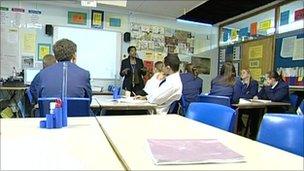School leavers lacking basic skills, bosses group says
- Published

Only 45% of pupils in England get a grade C or better in English and maths
Too many young people are leaving school without adequate basic skills, a survey of business leaders suggests.
More than four out of 10 are unhappy with youngsters' use of English, while 35% bemoan their numeracy skills.
The annual study of 566 UK employers for the Confederation of British Industry also heralds a shortage of high-skilled employees, particularly in maths and science.
The government said the CBI was right to raise concerns over basic skills.
The organisation's annual education and skills survey also suggests that many employers (44%) have had to invest in remedial training for school and college leavers.
Despite the claims, last year's GCSE results were the highest on record with seven out of 10 entries being awarded a grade C or above.
Companies also said young people lacked important employability skills.
Some 69% complained about inadequate business and customer awareness and 55% highlighted poor self-management skills.
The survey also highlighted a lack of available skilled staff. Some 43% were unable to find science, technology, engineering and maths specialists (Stem). And 53% predicted problems in finding such staff in the future.
Two-thirds thought the government should tackle these shortages by doing more to promote maths and science in schools and supporting Stem-related apprenticeships.
John Cridland, director general of the CBI, said: "It's alarming that a significant number of employers have concerns about the basic skills of school and college leavers.
"Companies do not expect schools and colleges to produce 'job-ready' young people, but having a solid foundation in basic skills such as literacy and numeracy is fundamental for work."
On the Stem shortage, he added: "With UK businesses looking to win a larger share of global markets as we re-balance the economy, the skills bar is constantly being raised by international competition.
"Higher-skilled employees, especially in science, technology, engineering and maths will be some of the most in demand.
"The government must improve the take-up of science and maths in schools and support the development of Stem apprenticeship programmes so that employers are able to recruit the right people to drive growth."
He added that with 930,000 16 to 24-year-olds currently inactive the "danger was stark".
'Key subjects'
A spokesman for the Department for Education said the CBI was right to raise concerns about the standards of English and maths of so many young people.
"Only 45% of young people get a C or better in GCSE English and maths at 16. And just 4% of those who fail then go on to achieve this from 16 to 19," he said.
"Yet it is good qualifications in these key subjects that employers demand before all others - that's why we are prioritising them."
The spokesman added: "The recruitment of specialist maths teachers, introducing phonics-based reading for six-year-olds and restoring the rigour of GCSE and A-level exams are all part of the overall package to raise participation across the board."
- Published23 September 2010
- Published24 August 2010